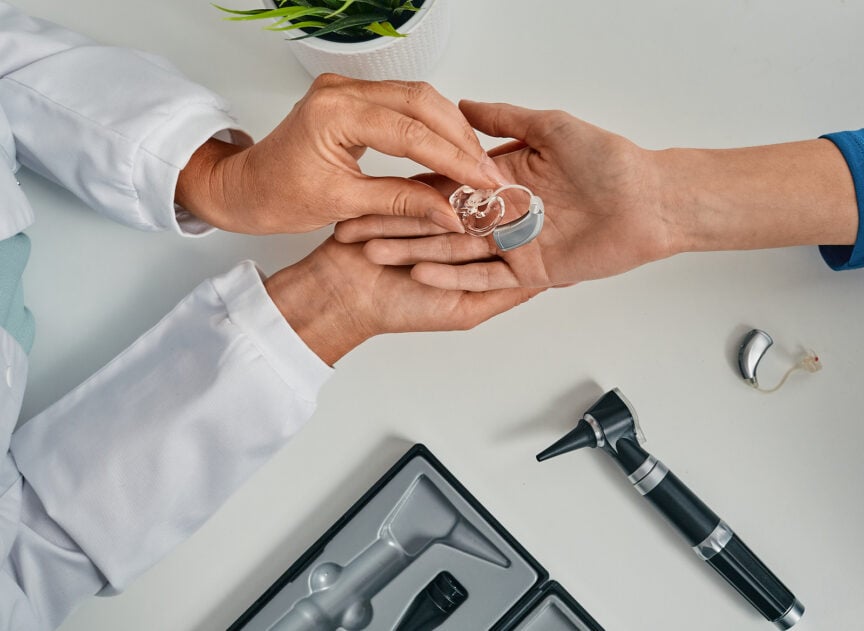Do you have hearing loss? If you’re considering hearing devices for the first time, you might be wondering if you should rent or buy hearing aids. Both options have unique benefits and drawbacks, and what works best for one person might not be ideal for another. Let’s look at the advantages and disadvantages of renting versus buying hearing aids so you can make an informed choice tailored to your needs, lifestyle, and budget.
Buying Hearing Aids: A Long-Term Investment in Your Auditory Health
Purchasing a hearing aid is a significant investment, not just financially but also in terms of your health and quality of life. Here’s what you need to consider:
Advantages of Buying
Tailored to Your Needs: When you buy a hearing aid, it’s customized to suit your specific hearing loss pattern, ensuring the best performance.
Long-Term Cost-Effectiveness: Initially, buying a hearing aid may seem more expensive. However, considering that a quality device can last five years or more with proper care, the long-term costs can be lower than renting.
Technological Ownership: Buying the latest model means you can choose a device with advanced features that renters might not have access to, such as Bluetooth connectivity or AI-driven adjustments.
Warranty and Servicing: Purchased hearing aids typically come with a warranty that covers repairs and sometimes even loss and damage, reducing long-term maintenance costs.
Disadvantages of Buying
High Upfront Cost: The most significant barrier to buying hearing aids is the high initial cost, which can be prohibitive for some individuals, especially those without insurance coverage.
Technology Gets Outdated: Like all technology, hearing aids can become outdated. You might find yourself wanting to upgrade to a newer model with better features, which requires another investment.
Renting Hearing Aids: Flexibility and Access to the Latest Technology
Renting hearing aids is a relatively newer option that is gaining popularity for several reasons. Here’s what makes renting appealing to some:
Advantages of Renting
Lower Initial Cost: Renting reduces the financial barrier to entry, allowing individuals to access hearing aid technology without the upfront cost.
Flexibility: Renting offers the flexibility to change devices as your hearing needs or technology advances, without the commitment of a large purchase.
Maintenance and Upgrades Included: Rental agreements often include servicing, repairs, and upgrades, ensuring you always have a well-functioning and up-to-date device.
Opportunity to Trial: For those uncertain about their needs or the benefits of hearing aids, renting can offer a no-commitment trial to evaluate how well the devices work for them.
Disadvantages of Renting
Ongoing Costs: While the initial cost is lower, the monthly rental fees can add up over time, potentially exceeding the cost of purchasing a device outright.
Limited Selection: Renters might not have access to the full range of devices available on the market, particularly the latest or most advanced models.
How to Choose
Deciding between renting and buying hearing aids comes down to evaluating your personal needs, financial situation, and lifestyle. Here are factors to consider:
Evaluate Your Financial Flexibility
Can you afford the upfront cost of purchasing, or would a monthly rental fee fit better with your budget? Remember to consider long-term costs and potential financial assistance or insurance coverage.
- Consider Your Lifestyle and Hearing Needs: If you lead an active lifestyle, work in demanding listening environments, or have rapidly changing hearing needs, the flexibility and upgrade options of renting might be more suitable.
- Think About the Future: Consider how long you plan to use your hearing aids and whether you’re someone who likes to have the latest technology. If you prefer to use a device for many years without the need for upgrades, buying might be more cost-effective.
- Seek Professional Advice: Consult with a hearing care professional. We can provide personalized advice based on your hearing loss, lifestyle, and preferences.
- Read the Fine Print: Whether renting or buying, always understand the terms. For purchases, know the warranty and trial period details. For rentals, check the contract length, what’s included in the monthly fee, and the terms for upgrades or cancellations.
The Best Choice Is Personal
The decision to rent or buy hearing aids is personal. It’s about balancing the financial aspects, your lifestyle, your hearing needs, and how you feel about technology upgrades. Some individuals will find the long-term ownership and customization of buying more appealing, while others will value the flexibility, lower initial cost, and access to the latest technology that renting offers.
Whether you want to rent or buy hearing aids, we have options to suit your needs. Book a consultation to learn more.

